Tour de France: Chris Froome, Mark Cavendish, Peter Sagan - all you need to know
- Published
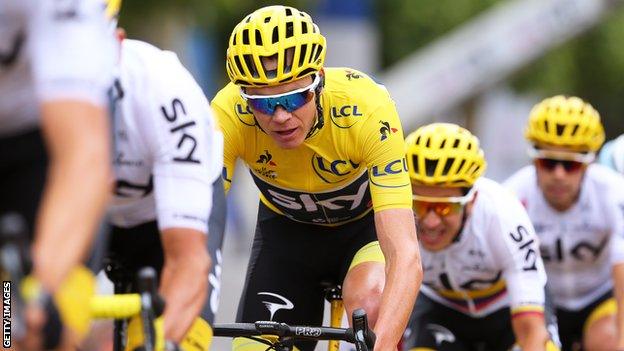
Team Sky leader Chris Froome is targeting a fifth Tour de France title in six years
Tour de France, 7-29 July |
|---|
Coverage: Live text commentary of every stage on the BBC Sport website. Commentary on Radio 5 live sports extra and website of every stage from 14:30 BST. |
The build-up to this year's Tour de France has been a bit like the hokey-cokey for defending champion Chris Froome.
The Briton has been in, out and back in the race again, depending on which reports you've been following this week.
But the four-time winner will be on the start line for the 105th edition of the Grande Boucle, which begins on Saturday in north-western France, after his anti-doping case was dropped by cycling's governing body, the UCI.
"Everyone wanted this to be resolved before the Tour so this is a huge weight off my shoulders," the Team Sky rider told BBC Sport.
"The last nine months have been really difficult for me and my family and my colleagues. It's great for everyone involved and great for the sport that we can put those answers to bed now and get on with the bike racing."
Will Froome make it a fantastic five?
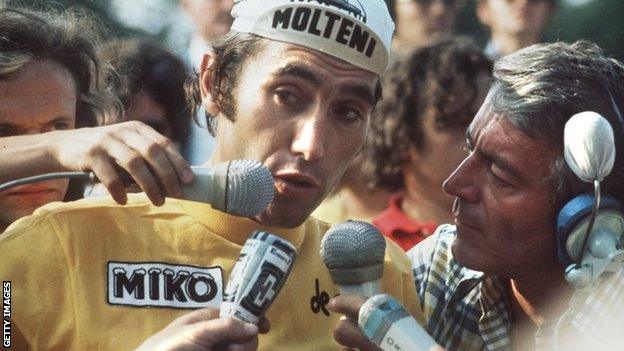
Eddy Merckx won his fifth and final Tour in the Vincennes velodrome in 1974 in the days before the race ended on the Champs-Elysees
If plain old 'Froomey' joins the quartet of quintuple Tour winners, will he get a nickname upgrade?
The first to win five Tours, Frenchman Jacques Anquetil in 1964, was called 'Monsieur Chrono' because of his time-trialling ability. Belgian Eddy Merckx, who won his titles between 1969 and 1974, was given the moniker 'The Cannibal' because he chewed up his rivals.
Known as 'The Badger' because of his tenacity on and off the bike, Bernard Hinault was the last Frenchman to win the Tour, in 1985. And Spain's 'Big Mig' - Miguel Indurain - is the only man to have won his five in succession, from 1991 to 1995.
Froome, 33, is chasing a fourth win on the trot, and fifth in six years, which would match Merckx - an achievement Team Sky principal Sir Dave Brailsford says "would put him right up there as one of the most legendary riders this sport has ever seen".
He is also looking to equal Merckx's record of four consecutive Grand Tour victories - set in 1972-73 - having followed last year's Tour win by becoming the first Briton to win the Vuelta a Espana and Giro d'Italia.
The latter victory, in May, came off the back of a meticulously planned sensational solo breakaway on stage 19, and Team Sky revealed how they pulled off that remarkable feat by sending Froome's nutritional and power data to BBC Sport.
Octopus curry and lots of rice - what does Chris Froome eat?
Who can stop Froome?
Tour organisers Amaury Sport Organisation (ASO) reportedly tried their best to stop him, external this week but were forced into a U-turn when the World Anti-Doping Agency advised the UCI to close the anti-doping case against Froome.
So that just leaves the other riders.
Fellow Team Sky rider Geraint Thomas has said he wants to challenge Froome and he will be allowed to do so, up to a point. He will become Team Sky's leader should Froome drop out of the race.
Adam Yates is the big hope of the Mitchelton-Scott squad. The 25-year-old Briton proved his Tour pedigree in 2016, finishing fourth to become the first Briton to win the best young rider prize. Like twin brother Simon, who led for much of the Giro, Adam is at home in the high mountains but his time-trialling may cost him.
"Simon did a really good race at the Giro - not just him but the whole team," said Adam.
"We sent a full team of climbers to a Grand Tour for the first time and focused solely on the GC. They held the lead for pretty much two weeks and were winning stages left, right and centre, so why can't we take that confidence and replicate it at the Tour?"
Italian Vincenzo Nibali may not appear to have had the best preparation - he finished 24th in the Tour warm-up race the Criterium du Dauphine - but it's hard to ignore the 33-year-old Bahrain-Merida rider.
He is good in the mountains and against the clock and will also enjoy the punchier climbs early in the race.
Of all the favourites, he will see the cobbles on stage nine as a chance to pick up time, having gained two minutes over his rivals on a similar route on his way to Tour victory in 2014.
After two runners-up finishes and a third place in recent years, 28-year-old Nairo Quintana will be hoping to add the Tour to his Giro and Vuelta successes.
The Colombian comes into the race more rested than last year, when he attempted the Giro-Tour double. After finishing second in Italy he faded in France to finish 12th. An explosive climber, he needs to gain time in the mountains because his time-trialling is weaker.
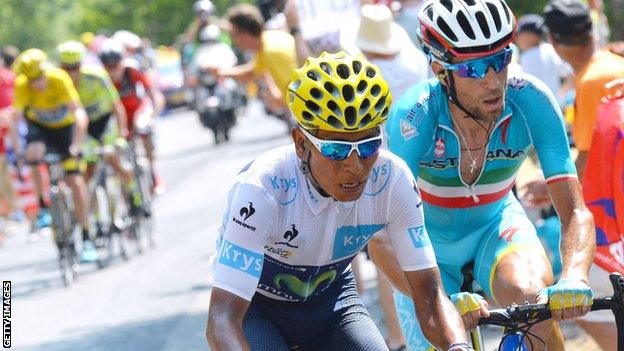
Nairo Quintana (left) and Vincenzo Nibali (right) are expected to be threats to Froome
Quintana is sharing team leader duties at Movistar with Mikel Landa and Alejandro Valverde. Spaniard Landa, 28, helped Froome win the 2016 and 2017 titles, but left Team Sky saying the squad had a "rigid mentality". He finished fourth last year.
At the age of 38, Valverde's Grand Tour-winning days are surely behind him, but he will be a threat on the punchier climbs and, having competed in 22 three-week races, his experience on the road will be valuable for Movistar.
French hopes again rest with Romain Bardet. The 27-year-old has won a stage in each of the past three editions of the race but his time-trialling has always let him down and there is nothing to suggest he has improved enough for that not to be an issue. He was second in 2016 and third last year.
One man who does not struggle against the clock is world time trial champion Tom Dumoulin, but will the Dutchman be able to cope in the mountains?
He did when he won the 2017 Giro and he pushed Froome close when finishing runner-up in Italy this year. However, he has tackled two Grand Tours in a year only twice and his best Tour finish was 33rd in 2014.
Of the other contenders, Rigoberto Uran, 31, was second last year and Jonathan Vaughters, his team director at Education First, claims this route "is more suited" to the Colombian than last year.
Australian Richie Porte is having his eighth crack at the race but is yet to win a stage and has a best finish of fifth in 2016. The BMC Racing leader also tends to have one bad day in a Grand Tour.
The outsider may be former ski jumper Primoz Roglic. The 28-year-old switched to cycling six years ago and possesses the necessary time-trialling and climbing attributes to suggest he could be a threat.
Where does the race go?
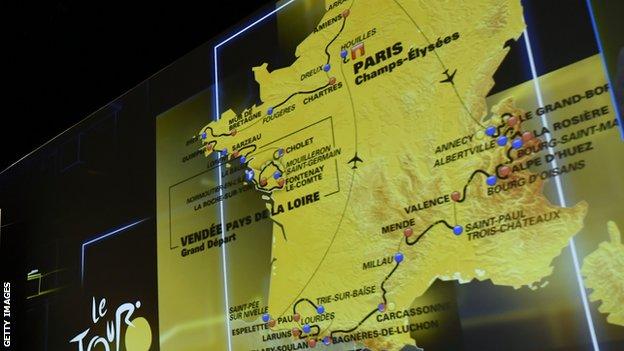
This year's race starts in western France and follows a predominantly clockwise direction around the country
This year's three-week, 21-stage race will take place almost entirely in France, with just 15km dipping into Spain when it hits the Pyrenees mountains.
A total of 176 riders - 22 teams of eight riders - will set off on the 3,351km (2,082-mile) route, which starts in the Vendee region.
The race stays in the north-west corner of France for most of the first week before a tricky stage nine in northern France sees the return of the cobbles, with 21.7km of them to negotiate, split across 15 sectors.
The Alps dominate the second week, with a return to the legendary Alpe d'Huez and its 21 hairpins, leading up to the summit finish.
The final week is largely in the Pyrenees, where the riders will tackle a new climb, the Col du Portet, the highest pass in the French Pyrenees at 2,215m and the highest point of the race.
A lumpy, bumpy 31km individual time trial on the penultimate stage could shake up the overall standings before the race heads for its traditional sprint finish on the Champs-Elysees in Paris.
Will Cav catch the Cannibal?
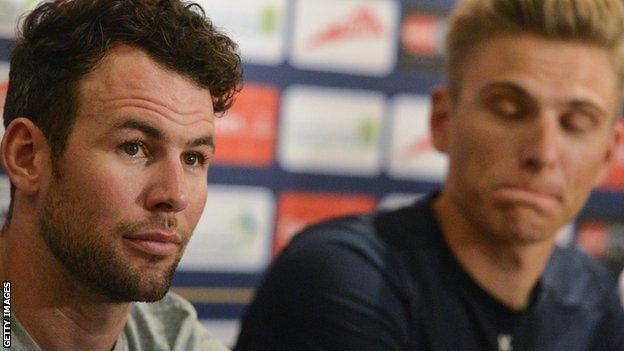
Will Marcel Kittel (right) stop Mark Cavendish (left) edging closer to Merckx's Tour de France stage wins record?
A British rider with a great nickname. Mark Cavendish - the Manx Missile - has won 30 Tour stages in a sensational career. He is only four behind Merckx's record.
Cavendish, 33, did not add to his haul last year because his Tour was prematurely ended when he broke a shoulder following a collision with Peter Sagan on stage four.
World champion Sagan was disqualified, ending his hopes of winning a record-equalling sixth green points jersey, but the Slovak is back and again favourite to win that classification.
Stage one is tailor-made for the sprinters, and Cavendish says Merckx's mark is "really the only target" he has left.
"It seems so close yet it is a big distance away," he said. "If it's not this year so be it, but I'll try to get it before the end of my career, that's for sure."
Marcel Kittel, 30, won five stages last year to take his personal tally to 14, while fellow German Andre Greipel, 35, heads into his eighth Tour with 11 stage wins, although last year was his first without a victory.
Dutch sprinter Dylan Groenewegen, who won the final stage in Paris last year, will also be in the mix, while Norwegian Alexander Kristoff and two-time French national champion Arnaud Demare cannot be ruled out.
Any other Britons in the race?
Only one. Luke Rowe is part of Team Sky's eight-strong squad and, while you may not see his name much over the next three weeks, his role as a domestique - he will sacrifice himself to help keep Froome away from crashes and well-positioned in the peloton on flatter stages - will be critical.
Lowe finished last year's Tour in 167th place to pick up the unofficial tag of 'lanterne rouge' as the last rider to finish the race. The term means 'red lantern' and refers to the light on the back of a train.
Rowe is the third British rider to finish last, following Tony Hoar in 1955 and John Clarey in 1968.
Last August the 28-year-old Welshman broke his leg while whitewater rafting on his brother's stag party in Prague.